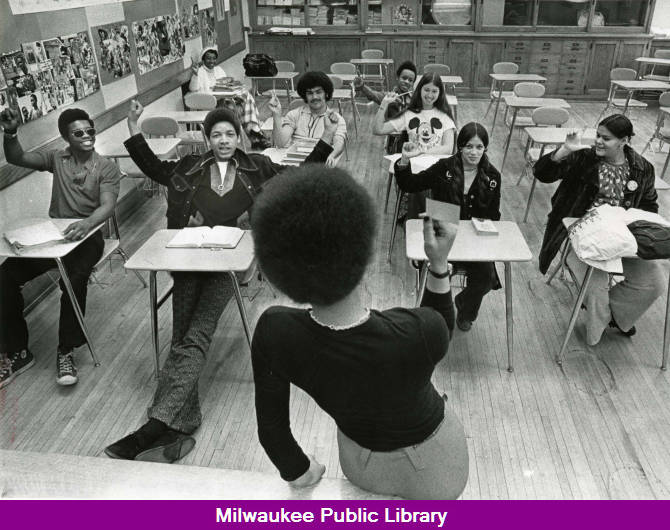Recollection Wisconsin has launched a refreshed website for educators teaching state and local history in K12 classrooms!

Milwaukee Public Library.
Recollection Wisconsin provides free online access to over half a million historical photos, maps, documents, and narratives that tell the stories of Wisconsin’s people and places. The site helps teachers find these valuable primary sources quickly and easily, so they can use them to spark students’ curiosity about the past and how it connects to the present and the future.
In addition to a general redesign, we’ve added new themes requested by educators, such as Famous Wisconsinites and Early Statehood. And, drawing on our popular #MainStreetMonday Facebook campaign, we’ve created the Travel Back in Time series, highlighting historical photos of communities all across the state, small and large, from Ashland to Wilmot. In this series, you can explore the diverse and endlessly interesting history of Wisconsin towns, including Kiel, once known as the Wooden Shoes Capital of Wisconsin, and Pleasant Ridge, a community near present-day Beetown founded by the formerly enslaved Shepard family that became home to many other freed and escaped enslaved people.
The materials in Recollection Wisconsin are drawn from 250+ Wisconsin organizations – libraries of all kinds, historical societies, museums, and government agencies – and shared with the world through Recollection Wisconsin and the Digital Public Library of America.
To stay in the loop with Recollection Wisconsin, follow us on Facebook and Twitter or sign up to receive our newsletter. In October, be on the lookout for our National Archives Month Image of the Day campaign.
This work is made possible by guidance from Recollection Wisconsin’s Education Advisory Committee, including experts from DPI, PBS Wisconsin, Wisconsin Historical Society, and Madison and Milwaukee public schools. Funding for this project was provided by the Green Bay Packers Foundation, the Jane Bradley Pettit Foundation, and the Alberta S. Kimball-Mary L. Anhaltzer Foundation. We are very grateful for this support.



You must be logged in to post a comment.